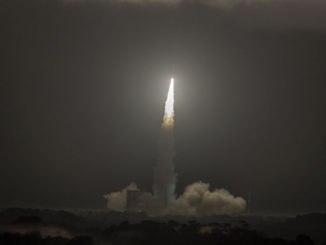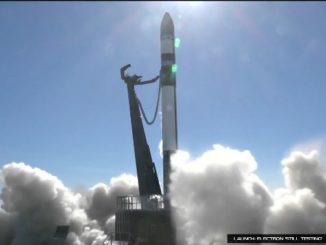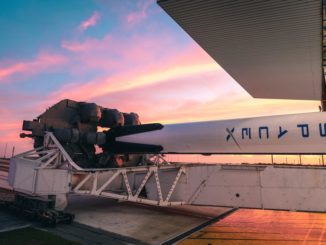
An attempt to place three small satellites in orbit on an experimental test flight was halted Friday after two ships strayed into a keep-out zone offshore Rocket Lab’s privately-owned launch base in New Zealand, delaying the Electron booster’s second demonstration mission at least 24 hours.
The countdown was stopped less than a minute before a planned liftoff at 10:10 p.m. EST Friday (0310 GMT; 4:10 p.m. New Zealand time Saturday) after officials detected two ships inside a danger area in the Pacific Ocean downrange from Rocket Lab’s launch pad in New Zealand.
Security teams helped usher the vessels out of the area, and the countdown was reset for another launch attempt. But engineers halted the countdown again to study a camera-related avionics issue.
The Rocket Lab team decided to reschedule the launch for Saturday, U.S. time, as unfavorable high-altitude clouds and winds passed over the remote rocket base on Mahia Peninsula, a formation on the east coast of New Zealand’s North Island.
“The team has been forced to scrub the launch for today following the manual auto sequence abort that was called due to two rogue vessels in the final two minutes of the count,” said Daniel Gillies, Rocket Lab’s mission management and integration director, who provided commentary on the company’s webcast of the countdown. “The team was able to prepare the vehicle for another launch attempt, however, the time required to clear both vessels, combined with weather, meant we lost our ideal launch opportunity for the day.”
Officials are looking for “ideal” weather conditions for the Electron rocket’s second demo flight — nicknamed “Still Testing by Rocket Lab.
The next four-hour launch window opens at 8:30 p.m. EST Saturday (0130 GMT; 2:30 p.m. New Zealand time Sunday).
The 55-foot-tall (17-meter) Electron rocket is designed to loft relatively lightweight payloads into orbit, filling a niche in the commercial launch market, which is currently dominated by larger launchers. Rocket Lab aims to sell Electron flights to satellite operators for $4.9 million per launch, a fraction of the price of any other rocket in service today.
The second Electron test flight follows the maiden launch of the rocket in May 2017, when the launcher reached space but fell short of achieving the velocity required to enter orbit. Rocket Lab blamed the mishap on a ground tracking error that caused controllers to lose communications with the vehicle several minutes after liftoff, prompting a safety officer to follow preset procedures and issue a command to terminate the flight.
The Electron rocket functioned normally up to that point, proving the performance of its first stage and partially demonstrating the design of its second stage.
The two-stage Electron rocket is powered by Rutherford engines developed by Rocket Lab. The powerplants consume kerosene and liquid oxygen propellants.
Three CubeSats owned by Spire Global and Planet, two San Francisco-based companies, are stowed aboard the second Electron rocket, targeting a polar-type orbit between 186 miles and 310 miles (300-500 kilometers) above Earth.
Email the author.
Follow Stephen Clark on Twitter: @StephenClark1.



